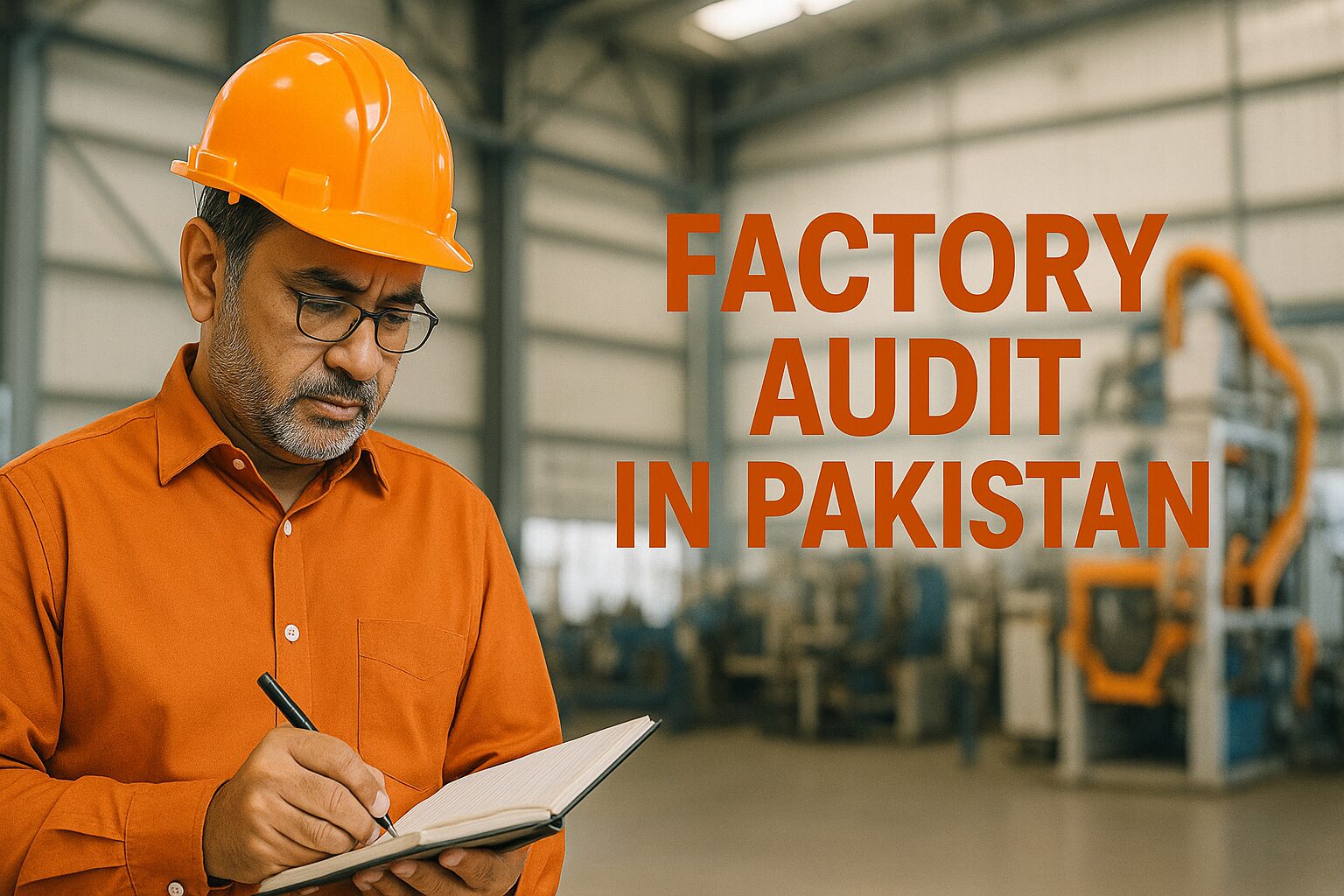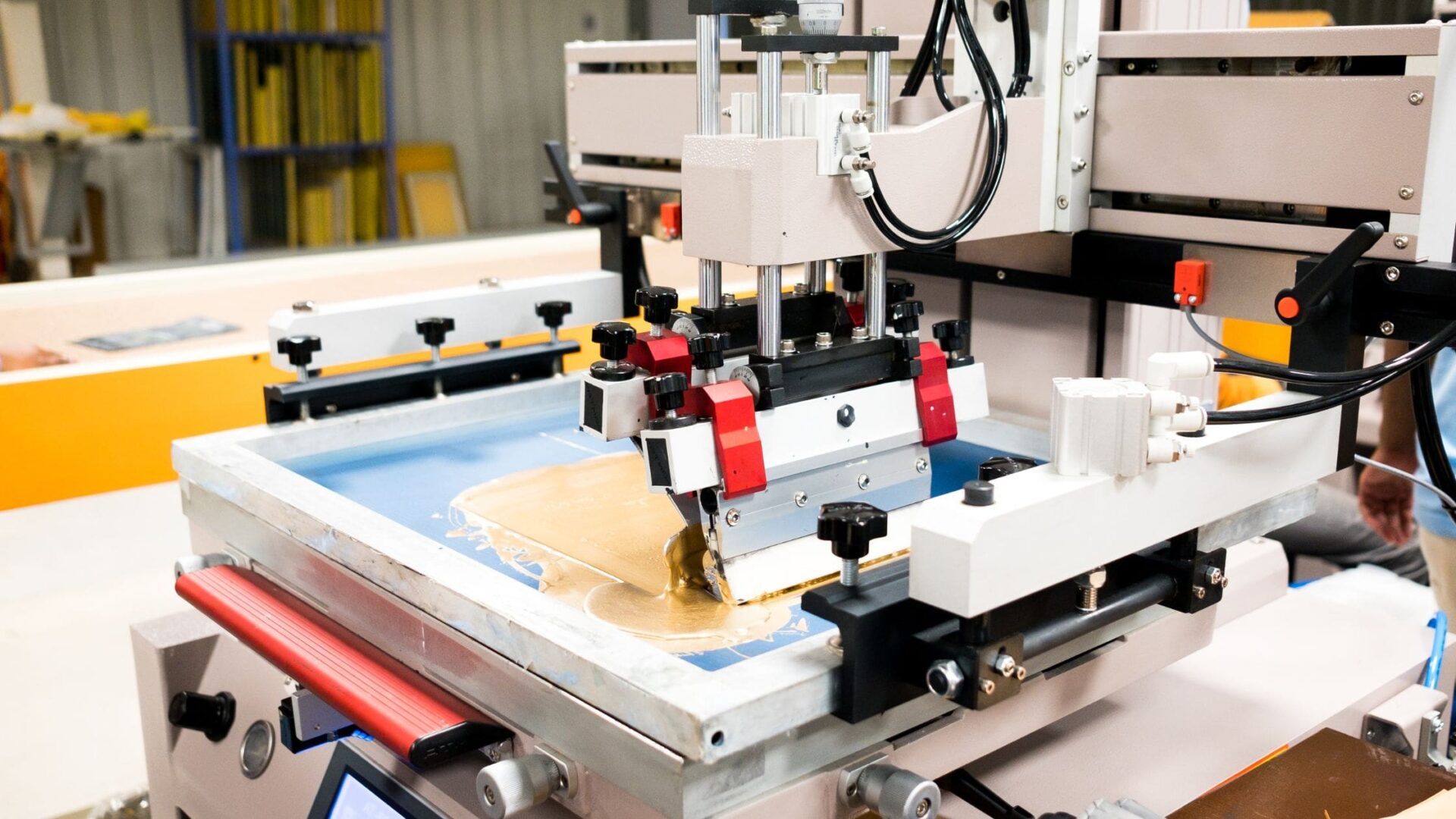When you’re sourcing from abroad, trust is everything. A factory audit in Pakistan gives you a clear way to check if a supplier can truly meet your product quality standards before you commit to an order.
More businesses are turning to Pakistan because of its strengths: premium cotton, advanced denim finishing, plush terry towels and home textiles, plus proven capacity in sports equipment and leather goods.
Karachi and Sialkot, long-standing export hubs, make the country even more attractive to brands searching for reliable supply chain partners.
During a factory audit in Pakistan, you’re arranging a structured supplier evaluation that reviews the manufacturing process, quality management system, and compliance with industry standards. Independent third-party auditors apply recognized methods such as AQL sampling under ISO 2859 or ANSI Z1.4, benchmarked against ISO 9001, SA8000/SMETA, and ISO 14001.
This ensures that the facility runs with proper controls and highlights risks or product defects before shipment.
Crucially, audits should be paired with ongoing inspections, Initial Production Check, During Production Inspection, Pre-Shipment Inspection, and Container Loading Check, to ensure consistency from raw materials to shipment.
These audits matter because common risks include inconsistent yarn counts, dye penetration issues, batch variability across lines, undisclosed outsourcing, machine downtime, and documentation gaps. By working with professional factory audit services in Pakistan, you gain unbiased reports, transparency, and stronger customer trust.
In this article, we’ll focus on why these audits are essential and how they protect your business.
What is a Factory Audit in Pakistan?
A factory audit in Pakistan is a structured assessment of a supplier’s facility, systems, and manufacturing process designed to confirm whether the operation can deliver consistent product quality. When you commission an audit in Pakistan, you are asking either your internal team or an independent inspection company to evaluate the supplier across a wide set of checkpoints.
These checks typically cover the quality management system, capacity planning, process control, social compliance, environmental and fire safety, and security protocols.
Internal buyer teams sometimes carry out supplier audits, but most businesses rely on third party inspection services in Pakistan. Independent auditors and inspectors are often more familiar with local industries, whether textiles, garments, sports goods, leather, automotive components, electronics, or pharmaceuticals.
Their expertise helps uncover risks early, before you commit to an order.
During a factory audit in Pakistan, typical areas of review include ISO 9001 quality control systems, ISO 14001 environmental practices, or GMP compliance for regulated industries. Auditors also check machinery condition, calibration records, worker safety measures, and sub-tier supplier management.
The outputs you receive are practical: risk ratings, inspection reports with photo evidence, identification of non conformities, and a Corrective Action Plan with clear responsibilities. In many cases, re-audits follow to confirm that the factory has corrected issues.
With that foundation in mind, the next question is why so many global brands are now choosing Pakistan as a sourcing hub, and how audits support that decision.
Why More and More Brands are Sourcing from Pakistan?
Many brands are sourcing from Pakistan because of the country’s unique combination of raw materials, competitive costs, and industry range. The country is one of the world’s top cotton producers, offering strong and soft yarns used in apparel, fabrics, denim finishing, and plush terry towels within the home textiles sector. This natural advantage is paired with deep expertise across production lines in textiles and garments, making Pakistan a dependable source of product quality.
Another reason you see businesses turning to Pakistan is its cost-to-quality ratio. Factories provide competitive pricing while maintaining compliance with international quality management system standards such as ISO 9001. For you, this balance often translates into attractive landed cost without compromising on quality control inspection or pre shipment inspection requirements.
Beyond textiles, Pakistan’s industries extend to sports equipment from Sialkot, leather goods from Lahore and Karachi, and growing capabilities in pharmaceuticals and electronics. These manufacturing hubs have decades of export experience, supported by inspection services in Pakistan that help brands with supplier verification, product inspection, and quality assurance.
Why are Factory Audits Important in Pakistan?
A factory audit in Pakistan is one of the most effective ways you can protect your supply chain and ensure that a supplier is capable of delivering the product quality you expect. When you invest in audit services, you gain more than a checklist of requirements, you confirm that the supplier is a legitimate operation, not just a name behind emails. Auditors verify that approval samples actually come from the declared factory and identify whether undisclosed subcontracting is taking place in small workshops with little or no quality control services.
For textiles, home textiles, and garments, common pitfalls such as yarn count variation or dye penetration differences can compromise the final products. In other industries, you may see weight or finish variability across production lines, machinery breakdowns before shipment, or missing inspection reports. A factory audit in Pakistan helps catch these risks early and gives you inspection reports supported by photo evidence.
Equally important is compliance. Supplier audits evaluate labor practices, workplace safety, and environmental standards such as ISO 14001, along with security elements required by international frameworks like CTPAT. These checks reduce non compliance, protect your brand, and improve customer trust. To see why these evaluations matter so much, it helps to look closely at the specific quality and manufacturing risks that make factory audits in Pakistan indispensable.
What Common Quality and Manufacturing Risks Make a Pakistani Factory Audit So Important?
When you work with factories in Pakistan, there are recurring risks that make supplier audits critical. These issues affect product quality, timelines, and overall compliance, but each one has clear mitigation steps.
- Inconsistent Material Quality: Variations in yarn count, dye penetration, or raw material mixing create visible product defects. You should verify yarn counts, test incoming fabrics, and review laboratory testing results like COAs or lab dips.
- Batch-to-Batch Variability: Splitting an order across production lines can cause dimension or finish differences. Standardized work instructions and in-process checks using AQL sampling reduce these variations.
- Undisclosed Sub-Tier Outsourcing: Some suppliers move production to smaller workshops with no quality control inspection services. Mitigation involves full disclosure of sub-suppliers, their audit in Pakistan, and establishing traceability.
- Infrastructure-Linked Delays: Power outages and machine downtime disrupt production and cause delays. Evaluating backup power, preventative maintenance, and spare-parts inventory helps limit problems.
- Documentation Gaps: Missing inspection records make it difficult to confirm conformity. You should require document control for calibration, shipment approvals, and inspection reports, aligning with ISO 9001 requirements.
What Does a Typical Factory Audit in Pakistan Include?
A factory audit in Pakistan is not a single activity but a sequence of structured checks that help you verify whether a supplier meets quality assurance standards and industry requirements. These audits are carried out by professional auditors or an inspection company, often as part of supplier evaluation before you place an order. Each stage of the audit focuses on a specific area of the manufacturing process, providing inspection reports that highlight both strengths and non conformities.
- Social Compliance Audit (SQA): This step reviews working hours, wage and benefit records, age verification, and overall safety conditions. Auditors cross-check payroll data and interview workers to ensure compliance with frameworks such as SA8000, SMETA, and BSCI.
- Environmental & Fire Safety Audit (EFA): This part evaluates how a factory manages waste, emissions, chemical storage, and fire safety. It includes checking permits, alarms, extinguishers, and training drills, usually against ISO 14001 standards.
- Technical Audit: Here, the focus is on machinery lists, calibration records, line balancing, and quality control inspection procedures across production lines. It also measures whether testing capabilities meet specifications.
- Ethical Audit: This examines anti-corruption measures, discrimination prevention, grievance mechanisms, and how the supplier enforces its code of conduct.
- Security Audit: Auditors check perimeter controls, shipping and seal management, and cargo integrity, aligned with CTPAT-style checkpoints.
- Facility Inspection: This includes observing layouts, equipment condition, housekeeping, and storage environments. Photo evidence supports traceability from raw materials through finished goods to container loading.
How to Prepare for a Factory Audit in Pakistan?
Start by defining the audit scope, technical, social, environmental, and security, and share it with the inspection company or auditors in advance. Provide product specifications, quality management system requirements, and acceptance criteria. You should also agree on AQL levels and the sampling plan so the audit in Pakistan can focus on the right risk areas.
For textiles and home textiles, auditors often request approved color standards, lab dips, and trim cards. If you are sourcing from regulated industries such as pharmaceuticals or electronics, you will need to list GMP or IEC standards for compliance. Pre-audit supplier evaluation is equally important. You should shortlist suppliers by major manufacturing hubs like Karachi, Lahore, Faisalabad, or Sialkot and verify their legal entity, export history, and certification status.
Once you select a factory, confirm the audit schedule with clear contacts. Make sure auditors have full access to production lines, warehouses, and laboratories, and ask suppliers not to shift production to undisclosed sub-tiers during the process. Preparing a CAPA template in advance helps speed up the closure of non conformities once inspection reports are released.
Also, preparation looks different depending on whether you’re a buyer evaluating new partners or a supplier getting ready for inspection, so let’s break down each side.
How to Prepare for a Factory Audit in Pakistan as a Business
First, you need to provide a full tech pack, bill of materials, and approved samples that define critical-to-quality dimensions. Required documents include a quality management system manual, process flow, inspection records, calibration logs, maintenance history, subcontractor lists, and fire-safety permits.
You should also decide on an inspection plan across the order, including Initial Production Check, During Production Inspection, Pre Shipment Inspection, and Container Loading Check, supported by laboratory testing where relevant. Communicate re-audit triggers upfront, such as major non conformities or production line changes.
While this is what buyers should focus on, suppliers in Pakistan have their own set of steps to follow in order to meet audit expectations.
How to Prepare for a Factory Audit In Pakistan as a Supplier/Manufacturer
If you are a supplier in Pakistan, preparation shows buyers and auditors that you have control of your manufacturing process. Keep production plans, traceability records, worker rosters, wage slips, PPE records, and waste manifests updated and available. Ensure all machinery is calibrated, and display work instructions and quality control inspection checklists on production lines.
To address infrastructure risks, document your backup power systems and machine uptime metrics. Pre-approve sub-suppliers and keep certificates such as ISO 9001, ISO 14001, OEKO-TEX, or GMP ready for review. Finally, prepare a Corrective Action Plan owner list so your team can respond quickly if non conformities are reported.
What Happens During the Factory Audit Process?
A factory audit in Pakistan follows a structured sequence that ensures no critical area of the manufacturing process is overlooked. It begins with an opening meeting where auditors confirm the scope of work, AQL levels, and sampling plan. This step aligns expectations between the inspection company, the supplier, and your team.
Next comes the document review. Here, auditors examine business licenses, certifications, quality management system manuals, environmental permits, HR records, wage slips, safety logs, and equipment calibration documents. These files reveal whether the factory complies with industry standards and whether the reported capacity matches reality.
Afterward, a full facility tour is carried out. Auditors move from raw material receiving to production lines, quality control inspection labs, warehouses, finished goods areas, and dispatch points. During this stage, in-process checks are performed to validate line balancing, detect defects, and confirm that approved work instructions are followed.
Auditors also conduct worker and management interviews to verify wage compliance, safety training, and working conditions. Product inspection samples are collected and tested against specifications, while sub-tier outsourcing risks are checked through supplier verification.
The audit concludes with a closing meeting. Preliminary findings, non conformities, and a risk rating are presented, along with expectations for a Corrective Action Plan. Within an agreed timeframe, you receive a detailed inspection report with photos, laboratory testing evidence if applicable, and recommendations for next steps.
What Should You Do After The Pakistan Factory Audit?
Once the factory audit in Pakistan is completed, your priority should be to address the most critical risks identified. Start by building a Corrective Action Plan that specifies root causes, corrective measures, assigned owners, and closure dates. Depending on the severity, timelines for resolving non conformities typically range from 30 to 60 days.
Evidence is essential. You should validate fixes with photos of improved processes, updated records, or training attendance sheets. For high-risk findings, arrange a re-audit to confirm issues have been corrected. During this time, it is wise to integrate additional inspection services in Pakistan such as Initial Production Check, During Production Inspection, Pre Shipment Inspection, and Container Loading Check. These ongoing quality inspections help stabilize the manufacturing process and maintain product quality standards.
Beyond immediate fixes, audits should be tied to your long-term supplier evaluation. Update the supplier’s risk score and adjust their status on your Approved Vendor List. Some factories may be placed on probation or required to undergo further development, while others may be disqualified if they fail to meet basic quality assurance standards.
How Often Should You Audit a Pakistani Factory?
You should conduct an initial qualification audit before placing the first order, followed by audits every 3–6 months for high-risk factories, every 6–12 months for medium risk, and once a year for low-risk suppliers. Immediate re-audits are necessary after critical non conformities, new production line setups, relocations, or undisclosed sub-tier changes.
In industries with stricter compliance requirements, such as pharmaceuticals under GMP or automotive parts under IATF or VDA6.3, audits must occur more frequently. In these cases, layered process audits and in-process quality control checks are often carried out for each lot.
Audit frequency should also reflect order volume and complexity. Large orders or multi-line production require closer monitoring with regular quality control inspection and product testing to reduce product defects and disruptions.
How Much Does a Factory Audit In Pakistan Cost?
The cost of a factory audit in Pakistan depends on scope, location, and urgency, but you can expect to pay around $300–$400 for a general checkup that verifies manufacturer capacity in major hubs such as Karachi, Lahore, Faisalabad, or Sialkot. This type of audit in Pakistan is commonly used for supplier evaluation before you place an order, giving you confidence in product quality and compliance with international standards.
Several factors influence pricing. The depth of audit services matters: a full technical, social, and environmental assessment requires more man-days than a single-topic check. Costs may also increase if laboratory testing is included or if the audit is booked urgently within 48–72 hours. Travel to remote factories outside primary manufacturing hubs can also add to expenses.
Additional charges may apply for multi-site audits, re-audits to verify Corrective Action Plan closure, or when audits are paired with quality control inspection services such as Initial Production Check, During Production Inspection, Pre Shipment Inspection, or Container Loading Check. Remote or virtual audits offered by inspection services in Pakistan can help reduce travel time and costs, but for high-risk factories they are often followed by on-site verification.
What are the Key Manufacturing Hubs and Industries in Pakistan?
Karachi, Lahore, Faisalabad, Islamabad, and Sialkot are the leading centers, with additional activity in Rawalpindi, Gujranwala, Multan, Hyderabad, Quetta, and Peshawar. Karachi and Sialkot also serve as key logistics nodes with port and airport connectivity that support international supply chains.
Textiles remain the backbone of industrial activity, with Pakistan recognized as a global leader in cotton production. Faisalabad and Lahore are known for garments, home textiles, denim finishing, and terry towels. Sialkot stands out for sports equipment and is equally strong in leather goods, footwear, and fashion accessories. Karachi and Lahore also host suppliers in chemicals, pharmaceuticals, and engineering components.
Emerging industries include electronics, consumer goods, and automotive parts, with growing compliance to GMP, ISO 9001, and other quality management system standards. Despite these strengths, challenges exist: legacy equipment in some factories, inconsistent adoption of ISO and OEKO-TEX certifications, supply chain delays, and workforce skill gaps. These issues highlight the importance of supplier audits and inspection services in Pakistan.
How to Select the Right Pakistani Factory for Your Business?
The process begins with pre-screening. You should verify the supplier’s business license, export history, and company profile. This initial step weeds out non compliance and helps you avoid unreliable businesses. Next, check capability by reviewing machinery lists, production flow, and quality control solutions in place. Certification review is also essential, look for ISO 9001 or ISO 14001, OEKO-TEX for textiles and home textiles, and GMP for pharmaceuticals. Sample validation provides further assurance that the manufacturing process matches your requirements.
Once these checks are complete, conduct a factory audit in Pakistan. This includes technical, social, environmental, and security aspects to verify process controls and compliance with quality assurance standards. Auditors assign a risk rating and provide inspection reports with non conformities and a CAPA plan.
An inspection plan should follow across the order. Initial Production Check verifies raw materials and setup. During Production Inspection detects early product defects and helps stabilize production lines. Pre Shipment Inspection ensures product quality before dispatch. Container Loading Check secures packaging, quantities, and seal integrity.
You should also demand sub-tier supplier disclosure, ensuring traceability from raw materials to finished products. Agree on AQL sampling levels, laboratory testing requirements, and reporting timelines. Finally, use performance data such as defect rates, on-time delivery, and CAPA closure to upgrade or downgrade supplier status. And while in-house assessments are possible, many businesses turn to professional third-party inspection companies to maximize transparency and reduce risk.
Should You Consider Third Party Inspection Companies for Factory Audits in Pakistan?
Yes, independent auditors increase objectivity, efficiency, and access to local expertise. A third party factory audit is carried out by a neutral inspection company that evaluates a supplier’s facility against established criteria in quality, capacity, social compliance, environment, and security. The purpose is to provide unbiased inspection reports that reduce risks and strengthen supplier evaluation.
The benefits of using third party inspection services in Pakistan include:
- Unbiased Reporting: Findings are aligned to AQL, ISO, or GMP standards without conflict of interest.
- Local Coverage: Presence in major manufacturing hubs such as Karachi, Lahore, Faisalabad, Sialkot, and Islamabad reduces travel costs and accelerates scheduling.
- Industry Expertise: Auditors are familiar with textiles, leather, sports equipment, and emerging sectors like electronics and pharmaceuticals.
- CAPA Support: Detailed corrective action guidance and re-audit services drive long-term quality assurance.
- Integrated Inspections: Combined services such as IPC, DPI, PSI, and CLC allow continuous monitoring from raw materials to container loading.
QCADVISOR Factory Audit
QCADVISOR is recognized as a leader in supplier audits, helping businesses strengthen their supply chain in Pakistan and across Asia. As an international team of quality control experts, they provide audit services that go beyond catching product defects, they focus on preventing them before they happen. Their factory audit services are designed to give you confidence in supplier evaluation, quality assurance standards, and compliance with international regulations.
QCADVISOR offers multiple types of audits depending on your needs. A Factory Verification Audit confirms that the supplier’s facility exists and meets your basic requirements. A Factory Technical Audit dives deeper into machinery, production lines, and quality management system controls to validate technical capacity. A Corporate Social Compliance Audit checks labor, safety, and ethical practices. For businesses with unique needs, Customized Audits can be tailored to cover specific industry standards, from textiles and home textiles to pharmaceuticals, electronics, and consumer goods.
Their process is straightforward and transparent. You begin by booking your inspection online at least 48–72 hours in advance. After quotation and supplier confirmation, the team prepares a detailed checklist and assigns auditors with the right expertise. On the scheduled date, inspectors perform on-site checks, from raw material verification to finished product inspection. Approval samples are often used to evaluate subjective elements like fabrics, colors, or surface quality.
Within hours of completion, you receive illustrated inspection reports with findings, risk assessments, and recommendations. Their audits integrate seamlessly with quality control inspection services such as Initial Production Check, During Production Inspection, Pre Shipment Inspection, and Container Loading Check. With rapid availability across Pakistan’s key manufacturing hubs, Karachi, Lahore, Faisalabad, and Sialkot, QCADVISOR ensures you get full-chain transparency, reliable supplier audits, and long-term customer trust.
Could You Conduct Remote Or Virtual Factory Audits In Pakistan?
Yes, you can perform a factory audit in Pakistan remotely by using digital tools that replicate many aspects of an on-site inspection. Companies often rely on scheduled live video walk-throughs, moving step by step from receiving areas through production lines, QC labs, warehouses, and finished goods. Real-time screensharing of key documents such as QMS records, HR files, safety logs, and calibration data allows auditors to verify compliance with quality assurance standards. Geo-tagged photos add location confirmation, while product samples can be shipped to independent laboratories for product testing.
Remote audits are most effective for early supplier evaluation, restricted-access facilities, or confirming CAPA closure between full re-audits. Still, high-risk issues like undisclosed sub-tier outsourcing or hidden non compliance often require in-person checks.
QCADVISOR also offers a 360 Virtual Tour. This service lets you visit your supplier’s premises from the comfort of your home or office. In addition to detailed inspection reports, the QCADVISOR 360 Virtual Tour delivers an immersive and interactive experience, providing transparency across the supply chain without the need to travel to China or other manufacturing hubs.
Conclusion
When you look at Pakistan as a sourcing destination, it’s easy to see the opportunity. Pakistan offers strong value for sourcing, from textiles and home textiles to sports equipment, leather, and emerging industries like pharmaceuticals and electronics. But opportunity comes with risk. Without a structured factory audit in Pakistan, you face issues like inconsistent materials, hidden subcontracting, or documentation gaps that weaken your supply chain.
The smartest path is clear: qualify factories with thorough supplier audits, inspect products at every stage, and improve processes with corrective action plans supported by periodic re-audits. When you map audit frequency to supplier history, order volume, and sector standards such as ISO, GMP, CTPAT, and ISO 14001, you build a reliable system that protects your brand and ensures compliance.
If you want every shipment to reflect quality and trust, start by shortlisting suppliers in key hubs, define your audit scope and AQL, and partner with an inspection company that delivers transparency and long-term value.









